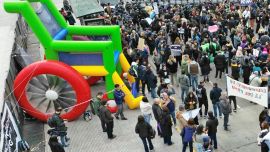Argentines will vote for a new president on Sunday, gripped by anxiety and with one thing in mind: escaping an economic quagmire that has seen annual inflation hit almost 140 percent.
Fury and fatigue after decades of economic crises have provided fertile ground for outsider Javier Milei, a libertarian who has surged to the front of the race with his vow to take a chainsaw to the bloated state and dollarise the economy.
The Buenos Aires lawmaker, who rails against the "thieving and useless political class" in power, is leading the polls against Economy Minister Sergio Massa and tough-talking former security minister Patricia Bullrich.
Argentina is Latin America's third-biggest economy – the grand boulevards and 19th-century European-inspired architecture in the capital hark back to its glory days as one of the world's richest nations.
That gilded age, fuelled by beef and grain exports, is a distant memory after decades of debt, inflation and financial mismanagement, which this year pushed poverty levels to 40 percent in the country of 46 million.
"It's total uncertainty – you never know if your rent will go up, [or] prices in the supermarket," said university student Valentín Figarra, 20. "It's madness, madness!"
"One wants to grow... but this generation is falling behind, it's sad."
'Highly incompetent'
Massa represents the centre-left Peronist Unión por la Patria coalition, a populist movement heavy on state intervention and welfare programmes that has dominated Argentine politics for decades but has grown deeply unpopular.
To woo voters, he has gone on a pre-election spending spree, slashing income tax for much of the population in a move analysts say will only make the country's fragile financial situation worse.
Bullrich served in the government of former president Mauricio Macri (2015-2019), a pro-market, non-Peronist who had promised a change from his overspending, fiscally irresponsible predecessors.
However, Macri failed to contain spending and took out a record US$44-billion loan with the International Monetary Fund, which has bailed Argentina out 22 times despite several massive defaults.
Voters are fed up with "politicians who have been highly corrupt, highly incompetent, who have never paid attention to something we learn in high school, that you shouldn't spend more than you earn," said Buenos Aires-based economist Andres Borenstein.
"In Argentina, we have been in deficit after deficit, so we borrow, then we default, then we print money because there is no credit available. And when we print money, we have inflation," he added.
Enter Milei, a TikTok-savvy outsider who showed up at rallies with an actual powered-up chainsaw vowing to slash public spending by 15 percent.
Political science student Agustín Baletti, 22, said past governments have "left young people without hope."
"Everything is already broken. Milei isn't going to break anything."
'Very difficult to change'
While some brim with enthusiasm for change, many voters are pessimistic.
"I am 70 and have seen this since I was born," said Irene Landa, a psychoanalyst sipping a coffee in the upmarket Buenos Aires suburb of Palermo. "I think it is very difficult to change this country."
She believes Bullrich is the "most coherent" of the lot.
"Milei, to me, it would be like giving a revolver to a monkey. But I think people are so fed up, so tired, that they believe in what he says."
Argentina's economic woes have affected everyone from the most vulnerable to the once-thriving middle class.
"The middle class has become the upper poor class now," said Landa, who has officially retired but keeps working as a safety net.
Like most, she saves by buying dollars whenever possible, a refuge from the volatile peso.
Analysts say any economic stabilisation plan would be painful in a country where millions survive off welfare and state employment.
To avoid a runoff election on November 19, a candidate needs to win 45 percent of the vote Sunday, or 40 percent with a difference of 10 points or more over the nearest rival.
Results are expected on Sunday evening.
related news
by Fran Blandy, AFP




















Comments